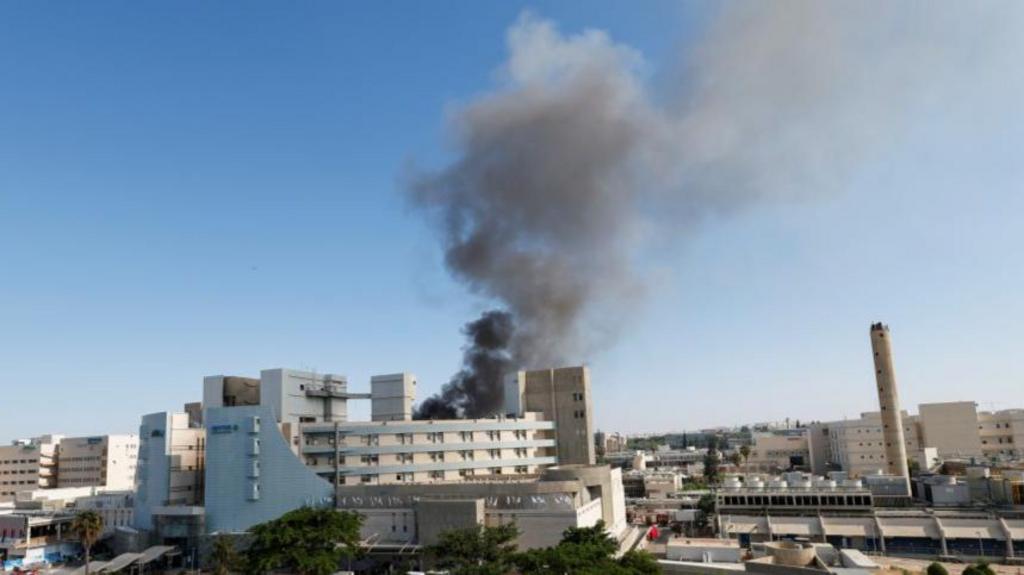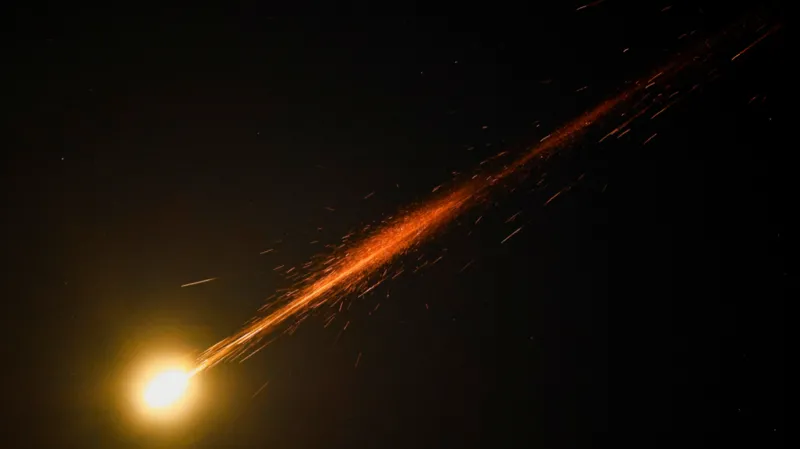Blasts rock Tehran, Tel Aviv; Iran warns Israel of ‘devastating’ attacks
Israeli security and rescue forces at the scene where a ballistic missile fired from Iran hit and caused damage in Tel Aviv, June 16, 2025. (Chaim Goldberg/Flash90)
Blasts rock Tehran and air raid sirens go off in Tel Aviv as Iran says it is preparing for what it calls the largest and most intense missile attack in history on Israeli soil, after a strike on Iranian state television.
Eight people were killed by Iranian ballistic missiles that slammed into Israeli cities in at least five locations early Monday, and nearly 300 others were injured, as the conflict entered a fourth day.
Four people were killed in Petah Tikva, three in Haifa, and another person in Bnei Brak.
The Health Ministry said 287 people were hospitalised nationwide as a result of the barrage of Iranian missiles. One person was listed in serious condition, and 14 were moderately injured, including two at Schneider Children’s Hospital in Petah Tikva. The remainder were lightly injured or suffered acute shock.
Two missiles also hit Tel Aviv, causing significant damage to a number of buildings, as well as some injuries.
US Ambassador to Israel Mike Huckabee confirmed in a post to X that the embassy branch in the coastal city was slightly damaged from an impact, but there were no injuries to staff. He said the American embassies and consulates remain closed, with a shelter-in-place order still in effect. The US embassy itself is located in Jerusalem.
Iranian missile barrages have repeatedly targeted the densely populated Tel Aviv metro area and surrounding cities since fighting began on Friday, as well as the Haifa area.
The Israel Defense Forces began airstrikes on Iran’s nuclear and military infrastructure in the early hours of Friday, acting to fight what it says is an immediate and existential threat to Israel from the Iranian nuclear and missile programs.
The campaign, which also included Mossad sabotage operations within Iran, has received support from many Western nations, which have affirmed Israel’s right to defend itself.
Shortly after midnight in the early hours of Monday, the IDF’s Home Front Command alerted the Israeli public to stay close to bomb shelters in the expectation of a missile attack.
Notifications were sent via a cellphone app that gives an early alert of possible attacks, which is generally followed by a second warning that is minutes ahead of sirens, at which point there is around 90 seconds to find shelter.
People evacuate after a missile launched from Iran struck Tel Aviv, Israel, June 16, 2025. (AP Photo/Baz Ratner)
350 missiles fired since Friday
Iran has launched some 350 ballistic missiles at Israel since Friday, the vast majority of which were intercepted, according to IDF statistics released Monday.
In all, 24 people have been killed in Iran’s ballistic missile attacks since Friday.
That number is expected to rise, as one person is still missing and presumed dead in a missile strike on a building in Bat Yam over the weekend.
Iran’s barrages consist of some 30–60 missiles each, according to the IDF.
Military officials said that Tehran has sought to fire more — hundreds at a time — but Israeli Air Force strikes on ballistic missile launchers in Iran are disrupting the attacks.
In each barrage, 5–10 percent of the missiles “leak” through and impact Israel, officials said. This includes missiles that the IDF says it does not try to shoot down “according to protocol,” allowing them to strike open areas without causing damage to any critical infrastructure, as well as missiles it failed to intercept which hit urban areas and caused casualties and damage.
The military has routinely emphasised that, as good as Israel’s multi-layered air defences are, they are not hermetic. It has urged Israelis to heed Home Front Command instructions to take shelter in safe rooms and bomb shelters when incoming missile warnings are received.
Most of Iran’s ballistic missile fire has been aimed at Tel Aviv and Haifa — which are densely populated — and to a lesser degree, the Beersheba area. This means that the few missiles that are not intercepted are likely to cause harm.
Petah Tikva
Home Front Command official Udi Elbaz told the press that an Iranian missile hit a 20-storey building in Petah Tikva, badly damaging its fourth and fifth floors.
“It is important for me to emphasise that in additional buildings we searched, most of the people who were in a protected space were not injured,” he told reporters.
Responders inspect a damaged building following a strike by an Iranian missile in Petah Tikva on June 16, 2025. (Jack GUEZ / AFP)
The IDF later clarified that the missile directly hit a bombproof room, which is an area built into modern Israeli buildings that has thicker walls and a blast door to protect against such attacks. Two people who were in one of the safe rooms were killed. The two other fatalities at that location were not in a protected space despite the sirens.
Haifa
Haifa Mayor Yona Yahav confirmed that three people were killed in a barrage targeting the northern city.
Yahav told Channel 12 news the three were working at a facility “that’s very important to us in the area, which we would be happy if it closed and left.”
It was later permitted for publication that the missile hit the Bazan oil refinery complex.
Rescuers had attempted for hours to reach the three missing people, who were buried under rubble during the attack on the northern city. A fire also broke out at the location, complicating rescue operations.
An Iranian missile attack a night earlier on Haifa caused “localised damage” at the oil facility.
Yahav said several homes and other buildings in the city suffered extensive damage, but only four people were hospitalised with light injuries.
Israel Police said officers were sent to clear international media journalists who have been broadcasting live missile impacts in the Haifa area.
“Coastal District police vehicles set out to conduct a search and handle the incident,” a spokesperson said.
Haifa is home to a number of sensitive facilities, including the oil refinery, a major port, and a naval base.
Bnei Brak
In Bnei Brak, a town east of Tel Aviv, the body of a man in his 80s was pulled out of a building that was damaged by a missile, authorities said on Monday.
The impact caused significant damage to a number of other buildings in the area.
Israeli security and rescue forces at the scene where a ballistic missile fired from Iran hit and caused damage in Bnei Brak, June 16, 2025. (Chaim Goldberg/Flash90)
At impact sites, rescuers helped evacuate hundreds of people from destroyed and damaged residential buildings.
The Magen David Adom emergency service reported that at one of the locations, which caused major damage to residential buildings along a street, a four-day-old baby was found in a destroyed building, but suffering no injuries.
Medics kept the child safe in an ambulance until his mother was extracted from a building about an hour later.
Rescuers work near a damaged building following a strike by an Iranian missile in Bnei Brak, east of Tel Aviv, on June 16, 2025. (Jalaa MAREY / AFP)
In addition to the missiles, eight drones launched at Israel from Iran were intercepted by Israeli Navy missile boats overnight, the IDF said, adding that it had used a new air defence system for the first time.
According to the military, it intercepted some of the drones using LRAD interceptor missiles, part of the BARAK MX air defence system, which were deployed to the Navy’s Sa’ar 6-class corvettes.
Since the start of the conflict on Friday, the IDF said, the Navy has intercepted some 25 drones heading to Israel, mostly from Iran.
The IAF has shot down around 100 other drones with fighter jets and helicopters.
Defence Minister Israel Katz threatened that Tehran’s residents would suffer in retaliation for the Iranian missile strikes that have caused widespread damage to Israeli residential areas.
“The arrogant dictator of Tehran has become a scared murderer who fires at Israel’s civilian home front in order to deter the IDF from continuing to carry out attacks that are destroying his capabilities,” Katz said in a statement, apparently referring to Iranian Supreme Leader Ali Khamenei.
“The residents of Tehran will pay the price, and soon,” he vowed, in what appeared to be a threat to target Iranian civilians in kind.
He later clarified that “there is no intention to physically harm the residents of Tehran, as the murderous dictator does to the citizens of Israel.”
“The residents of Tehran will be forced to bear the cost of the dictatorship and evacuate their homes from areas where it will be necessary to strike regime targets and security infrastructure in Tehran,” he said.












